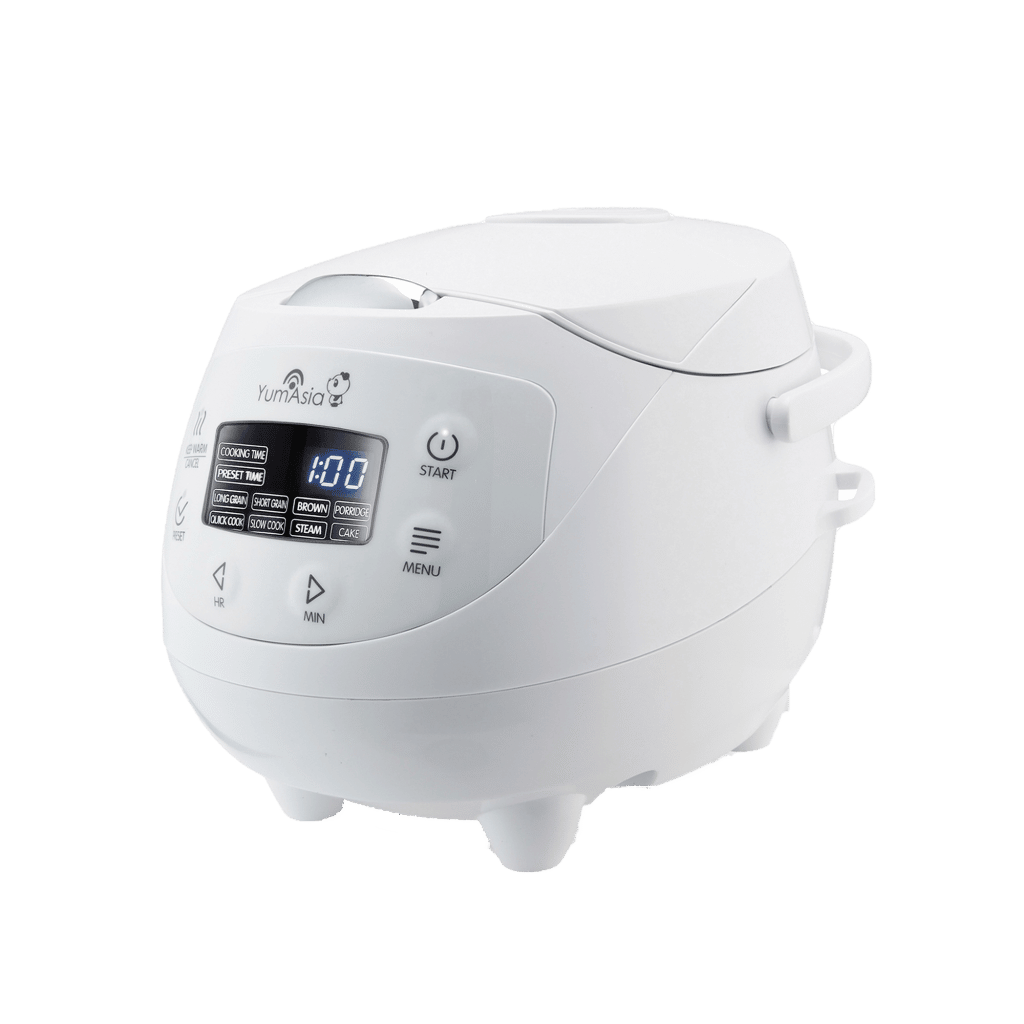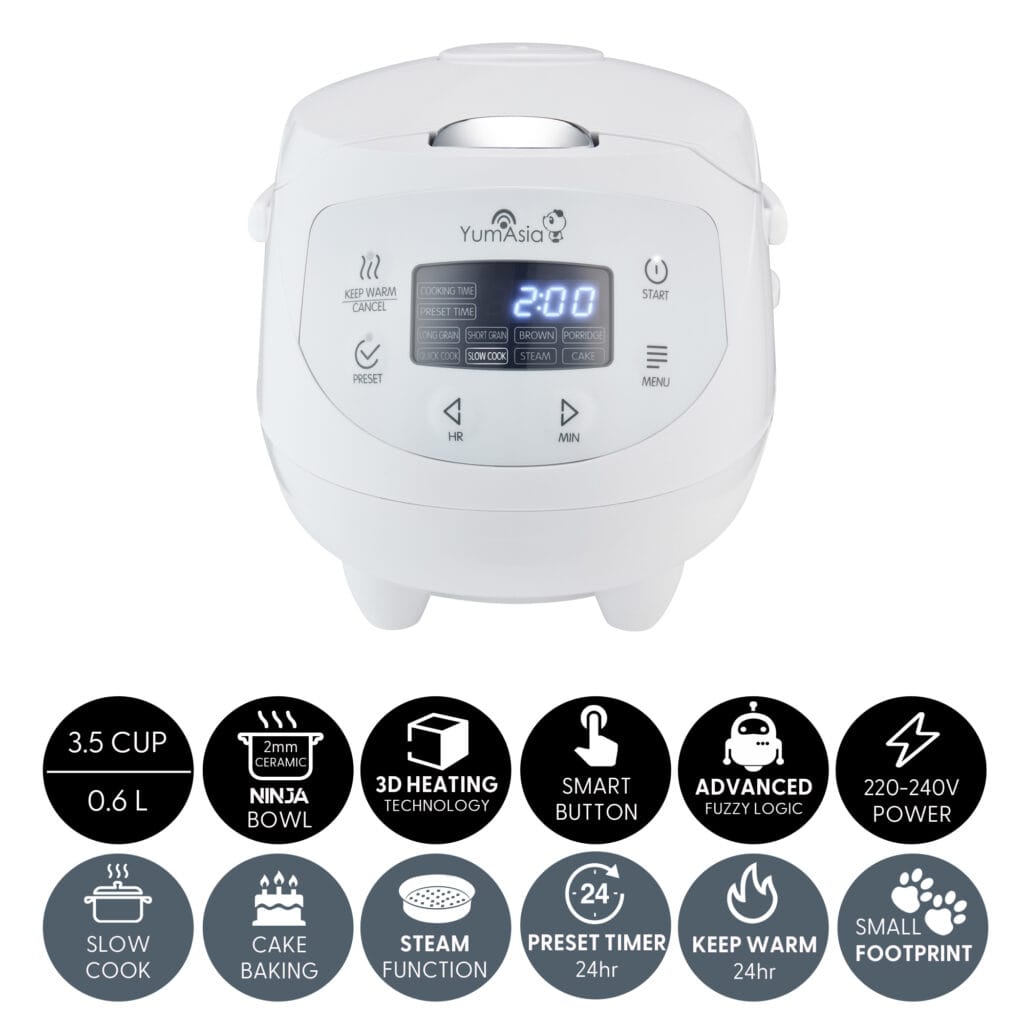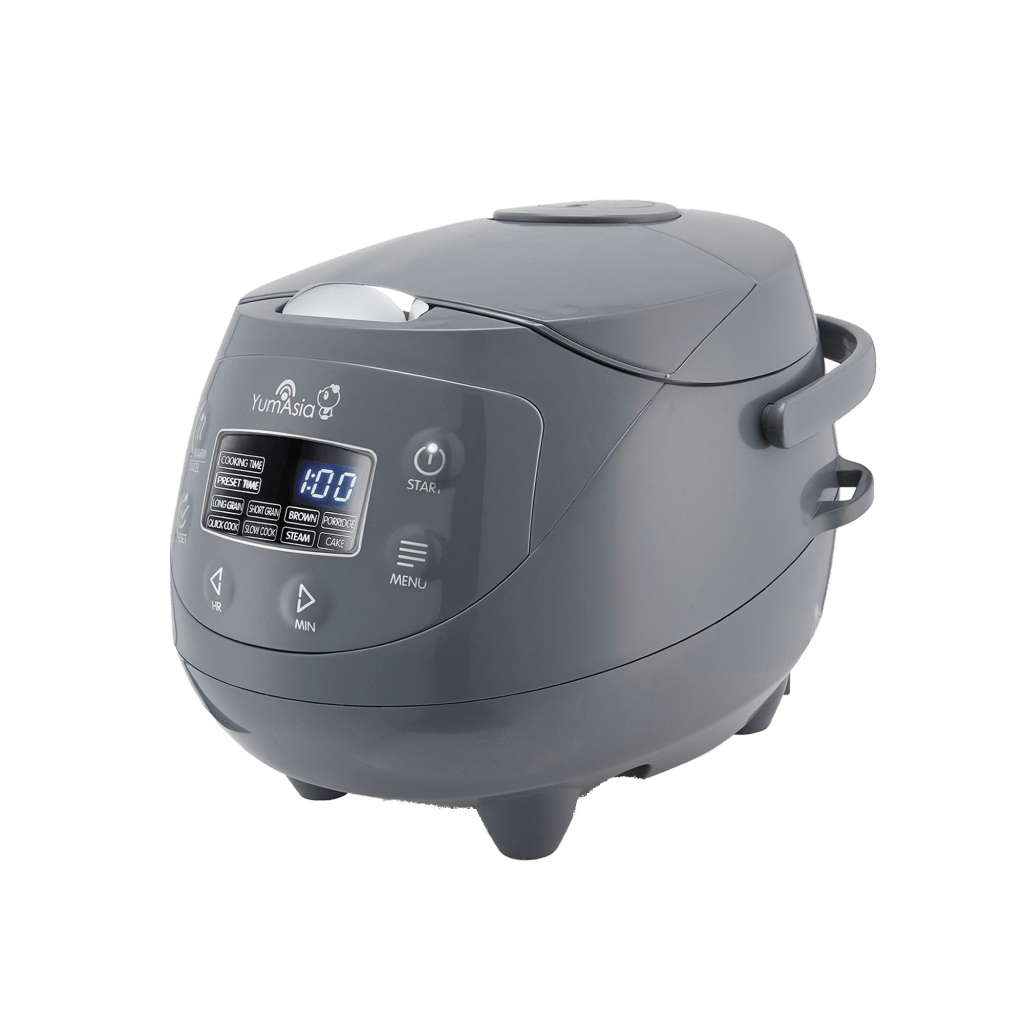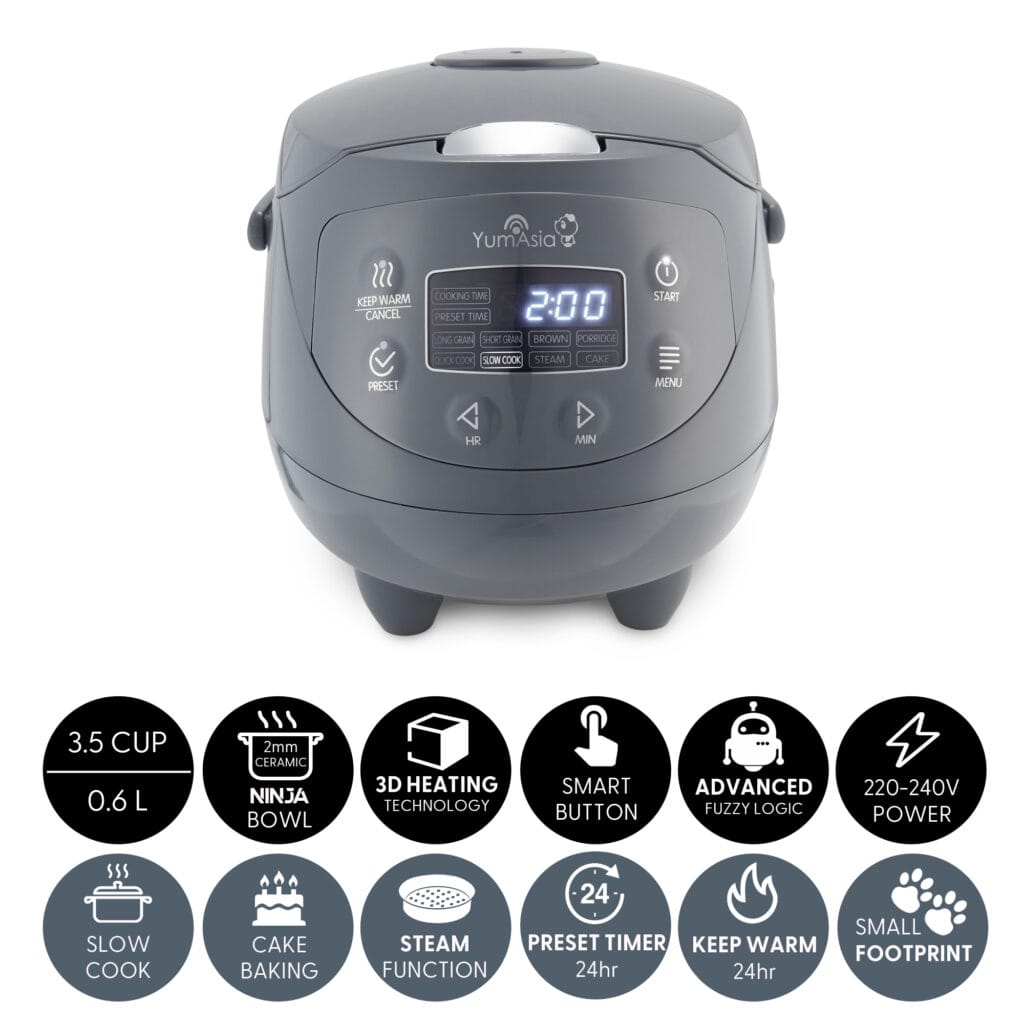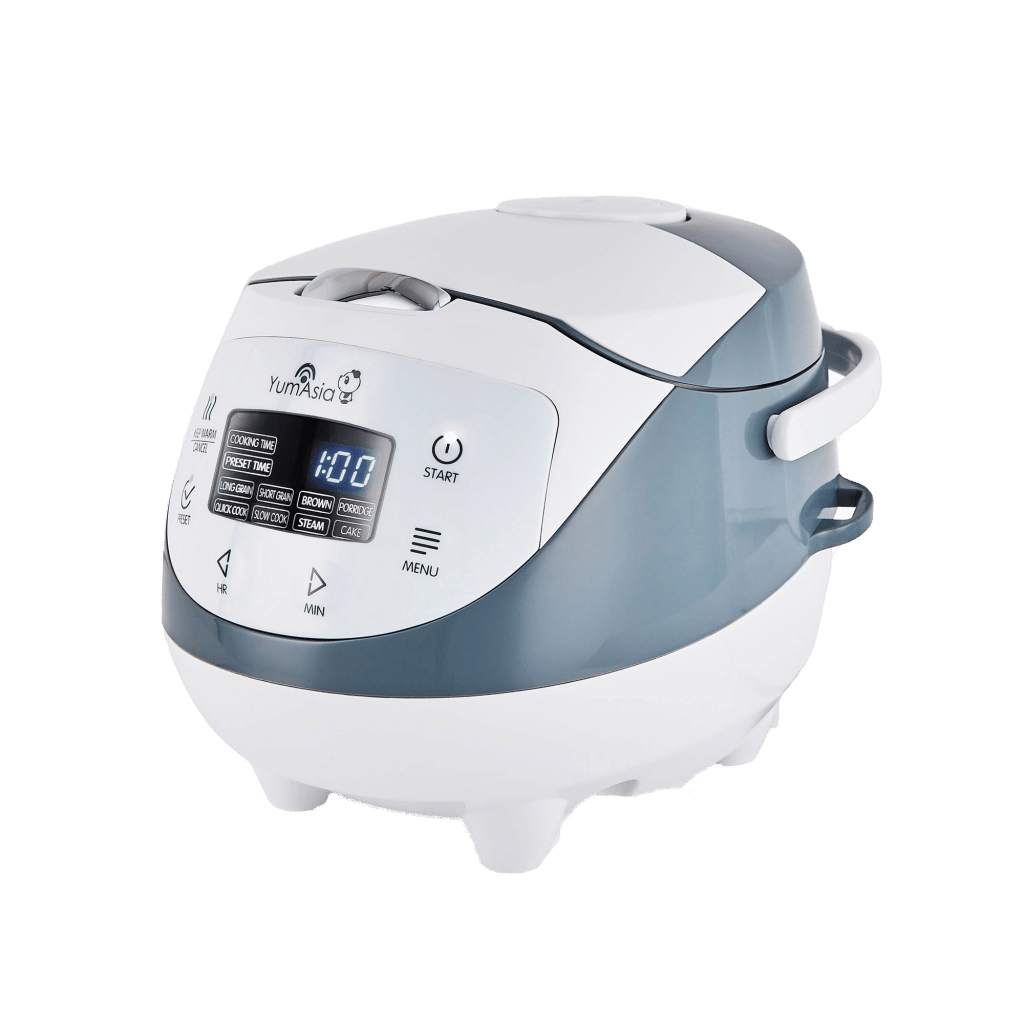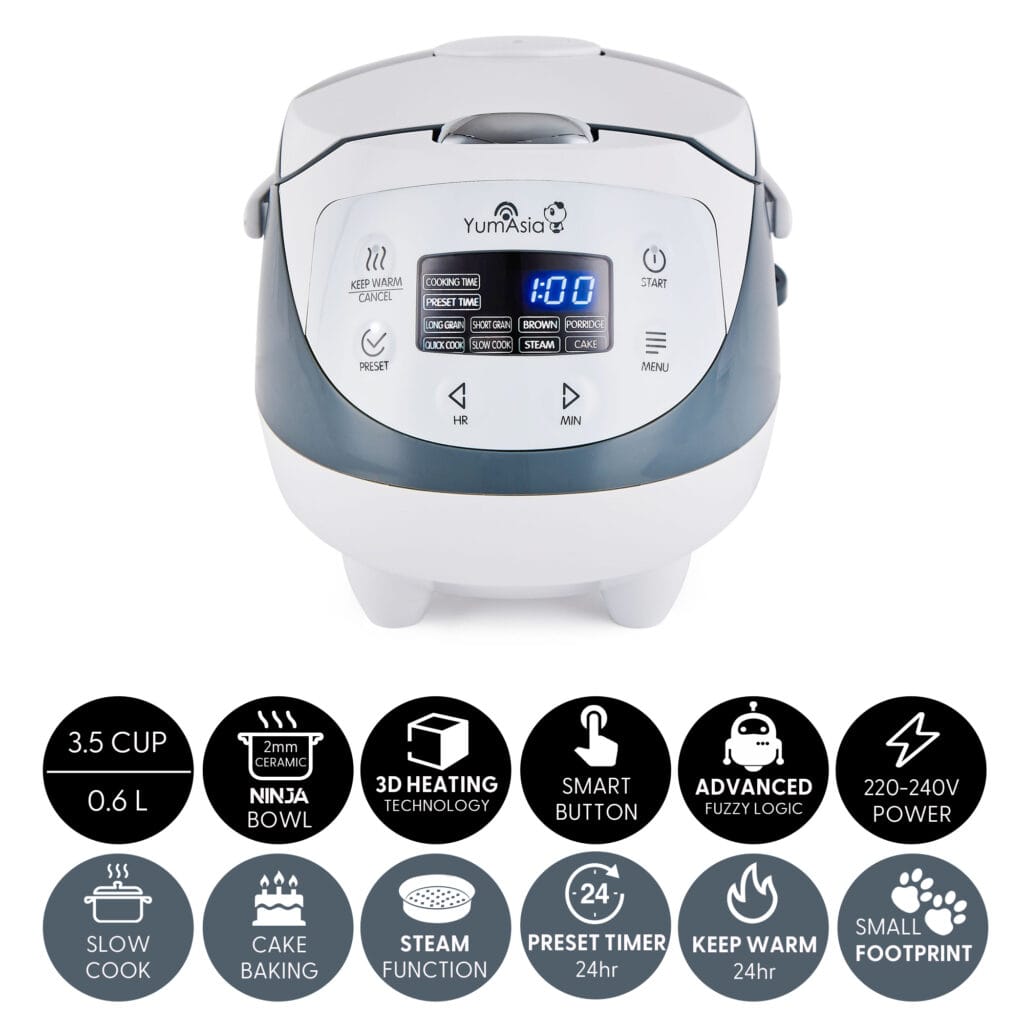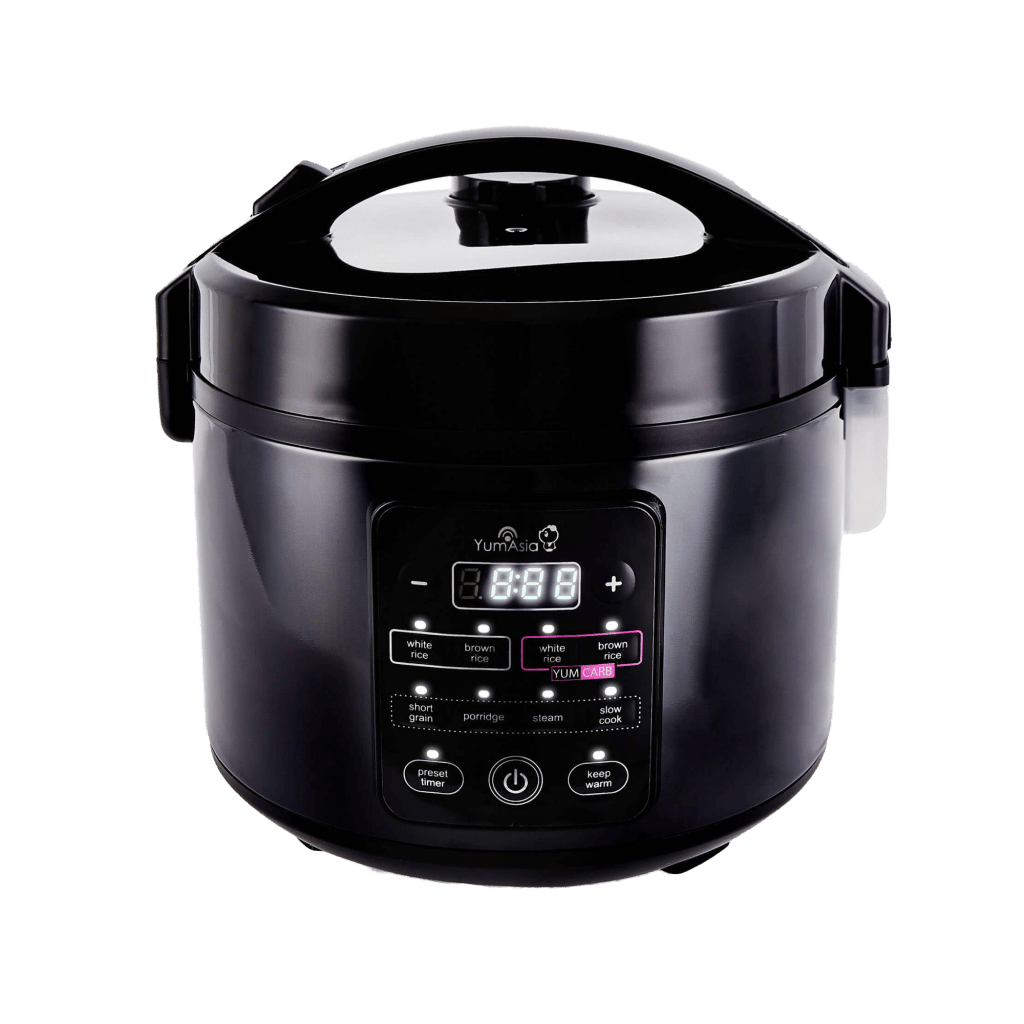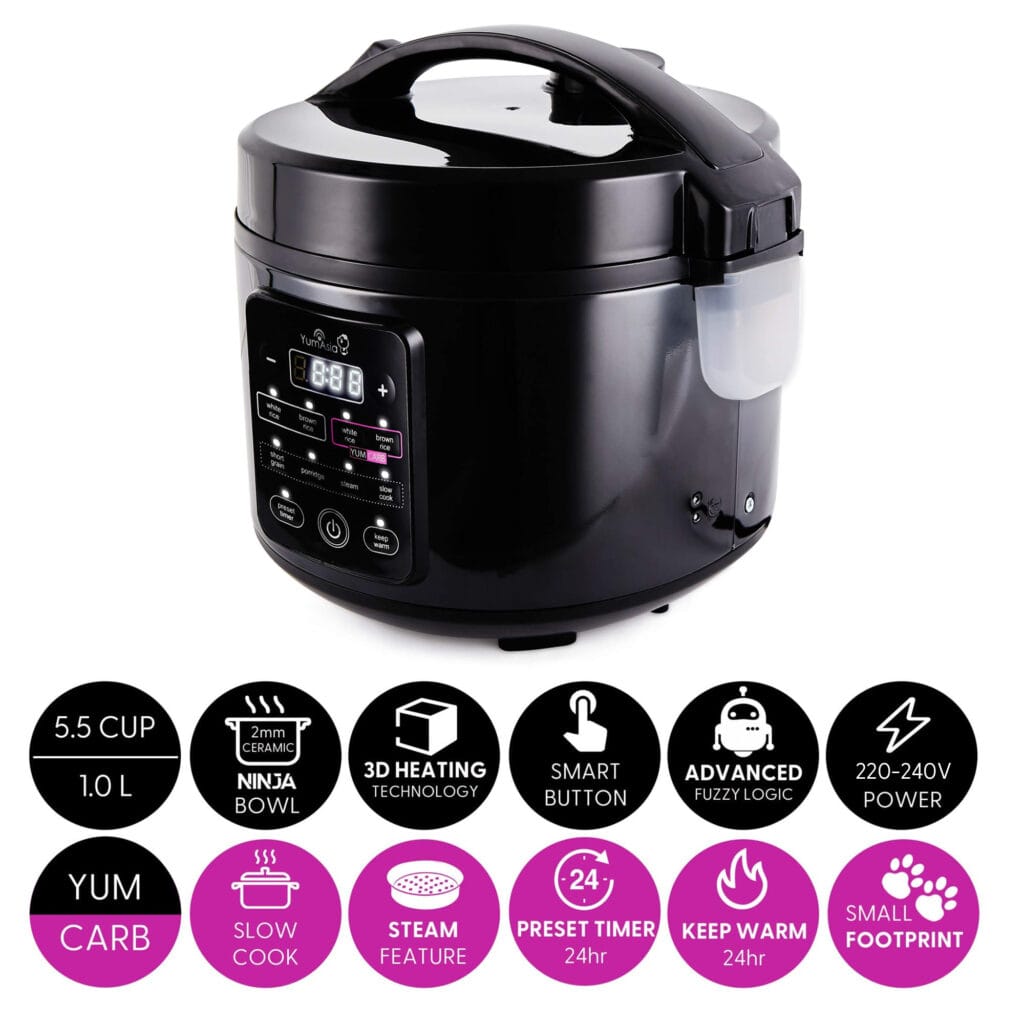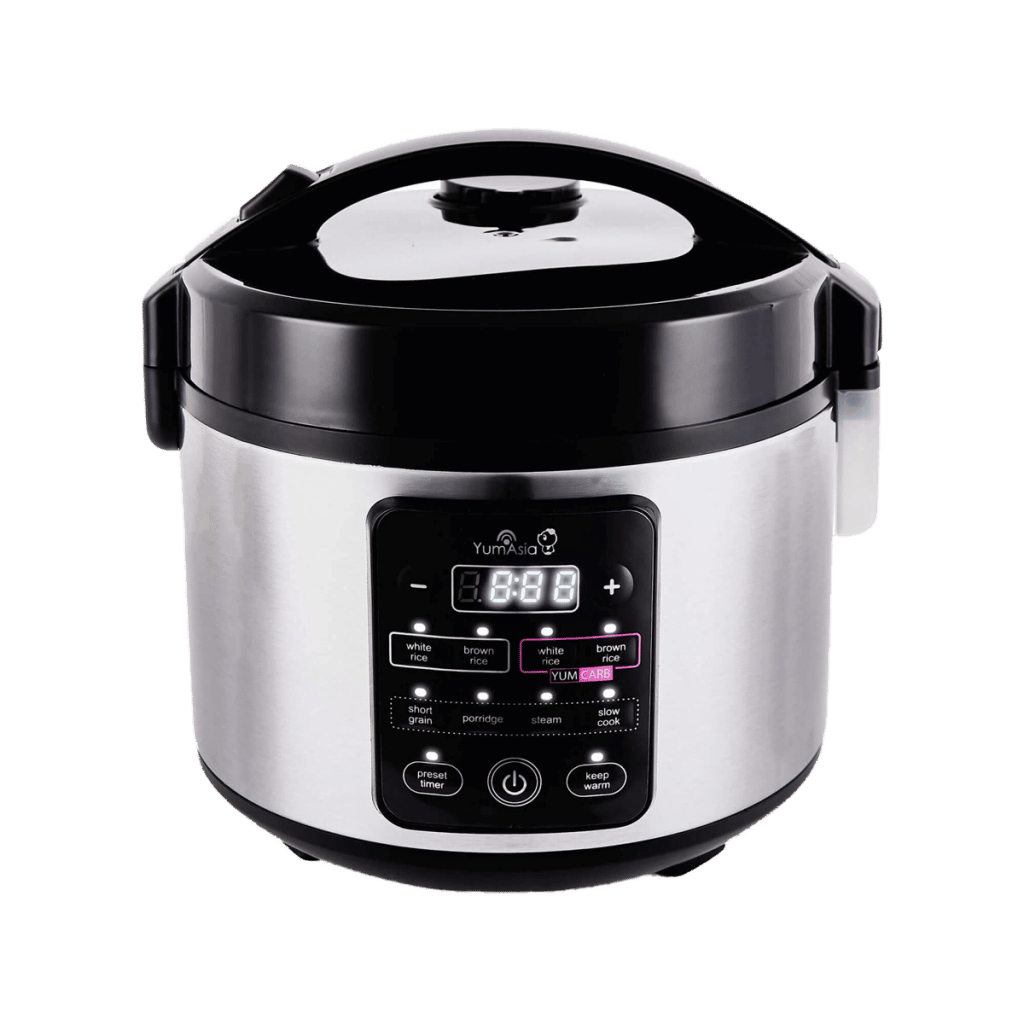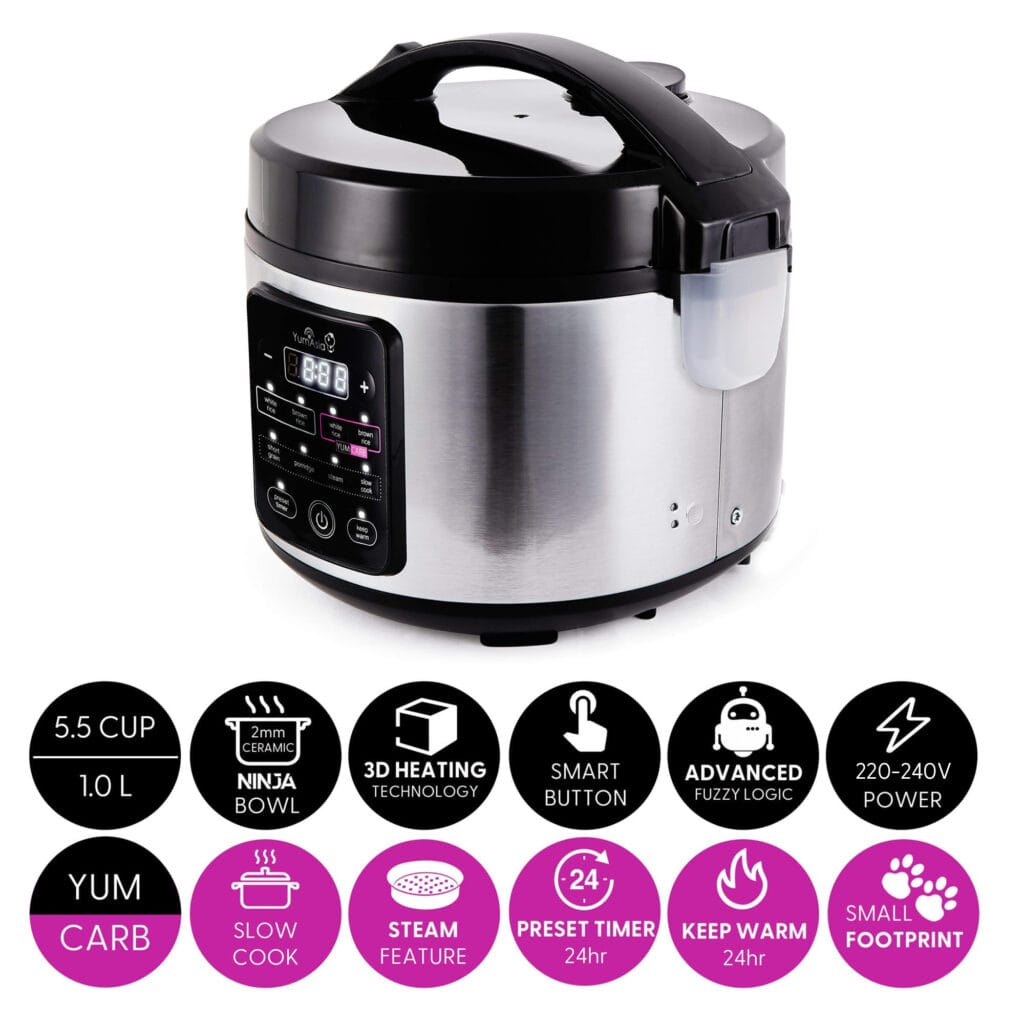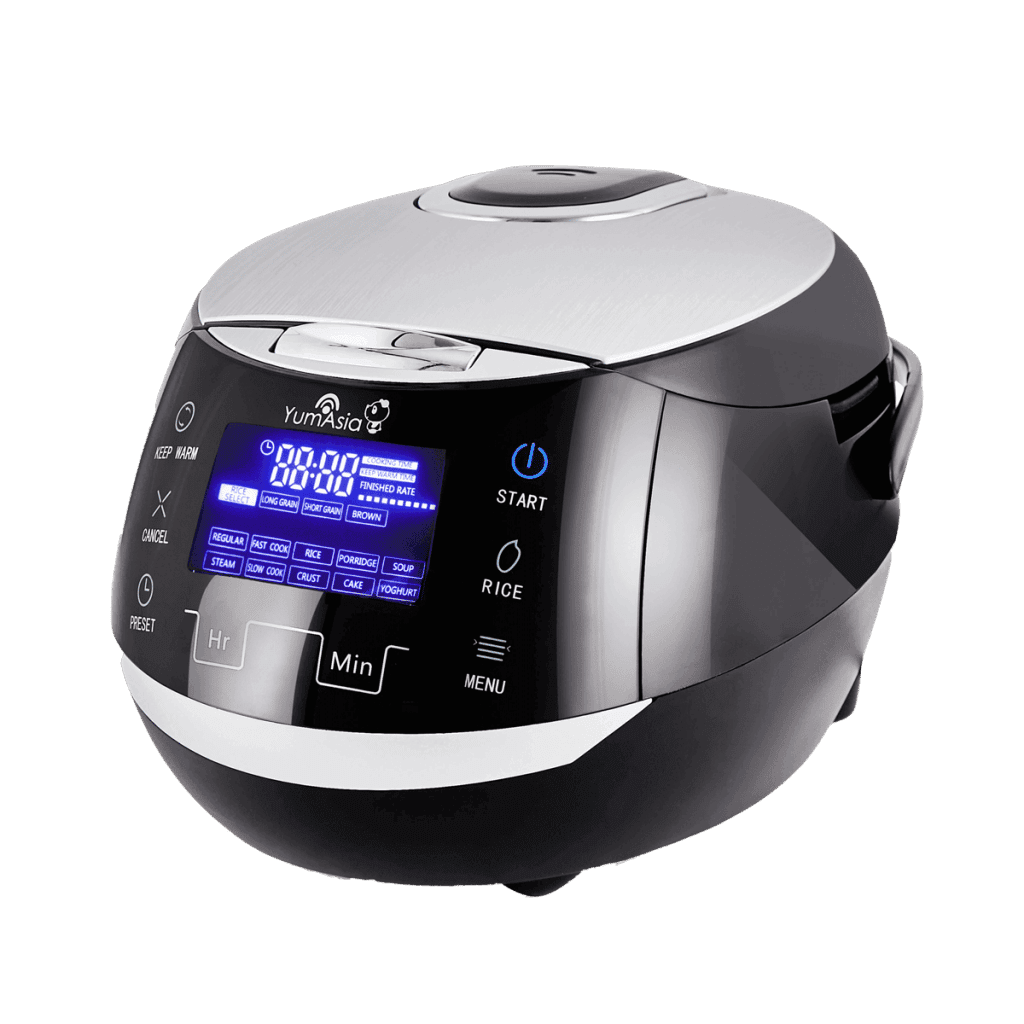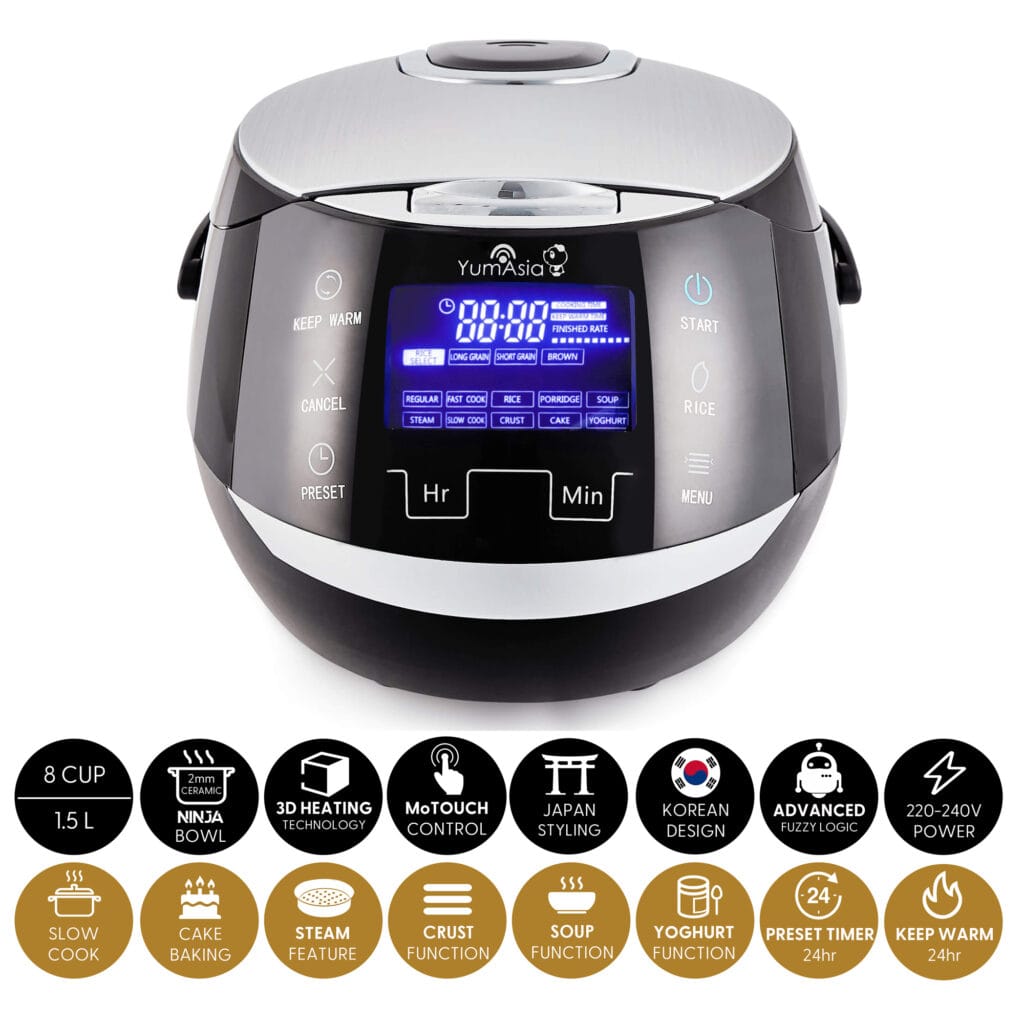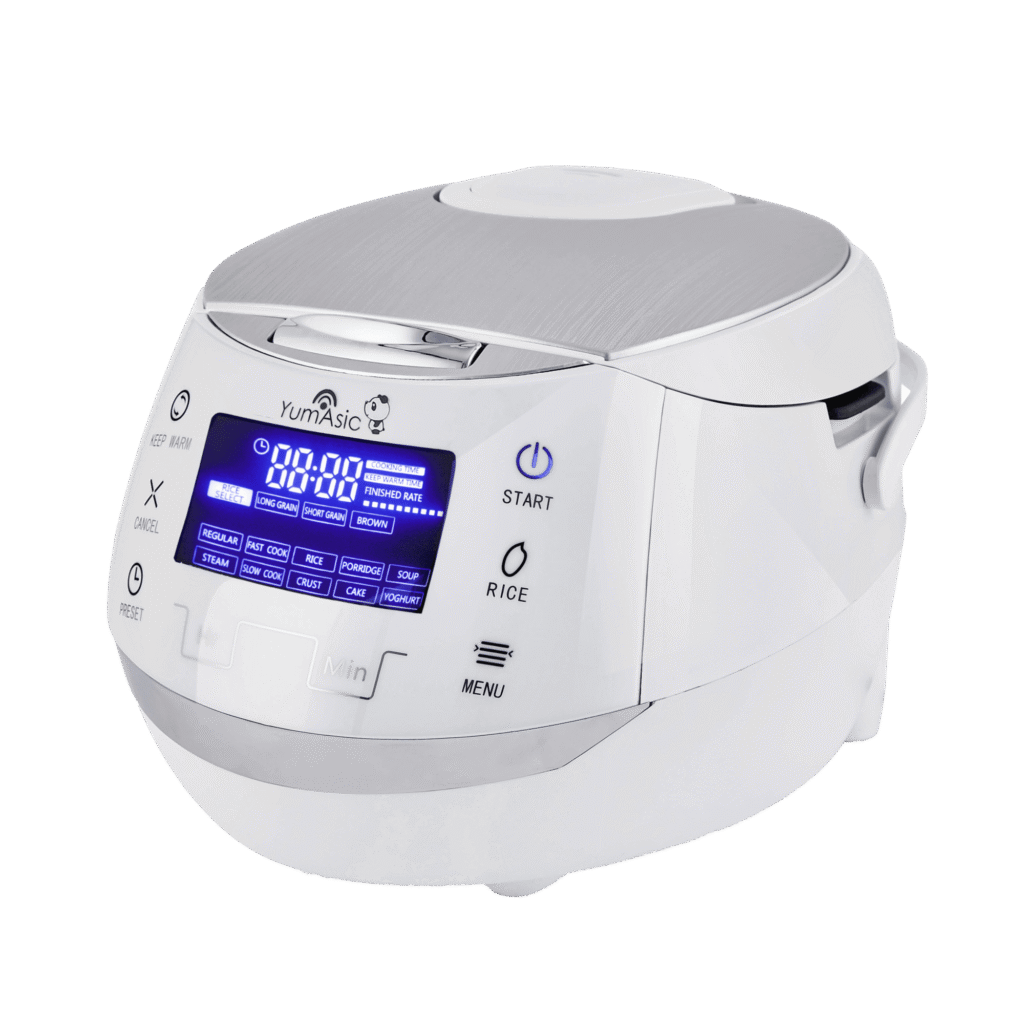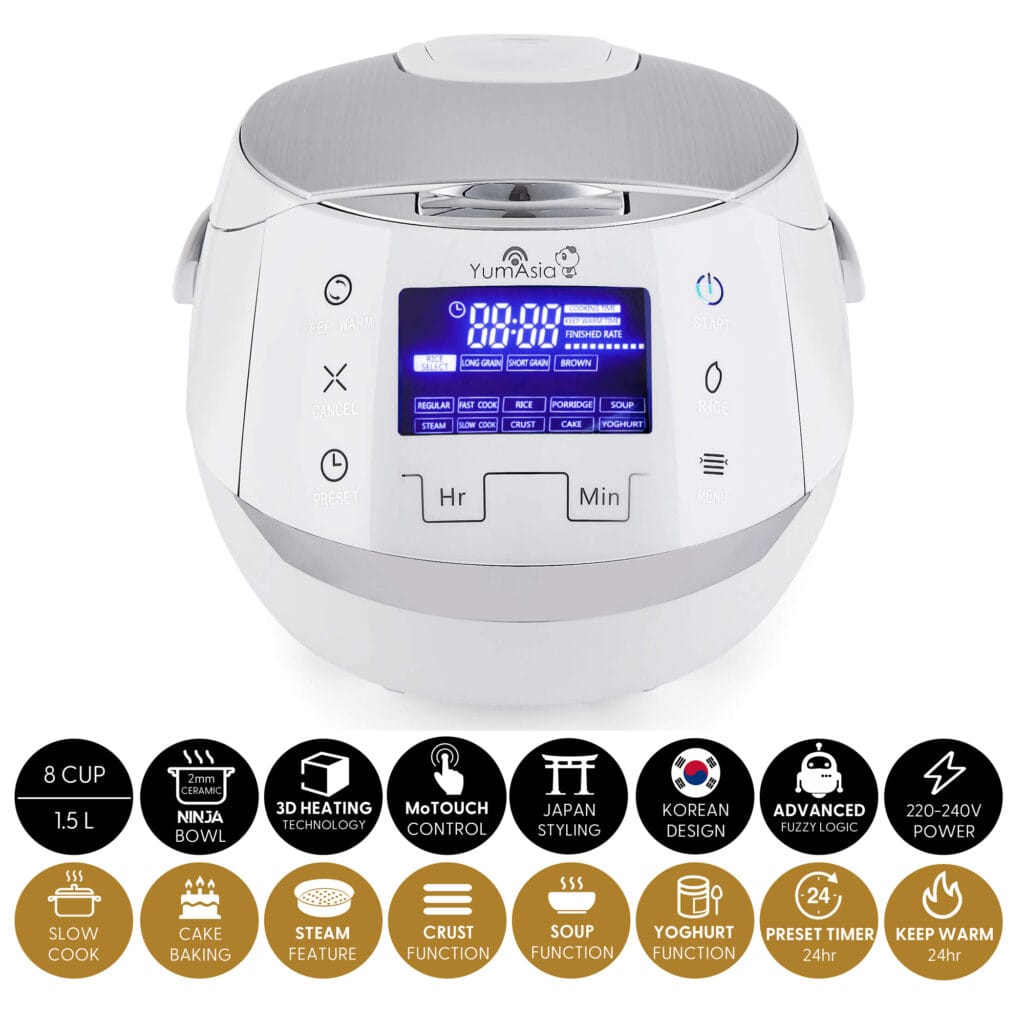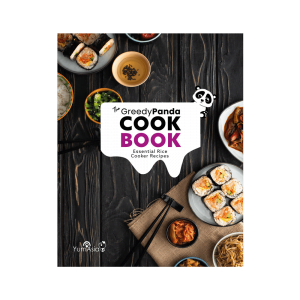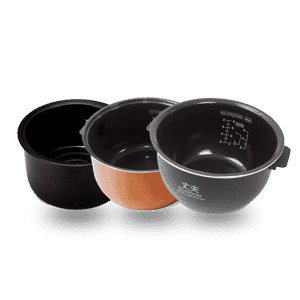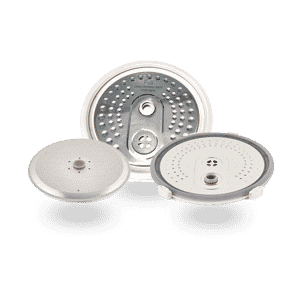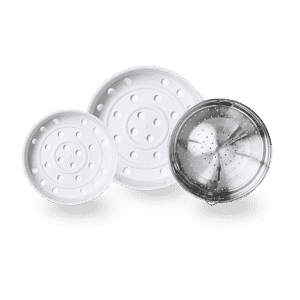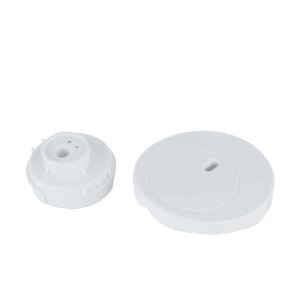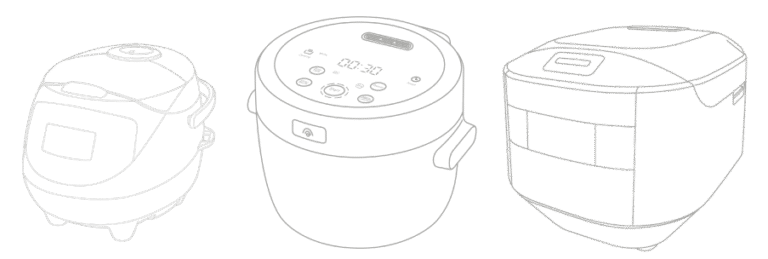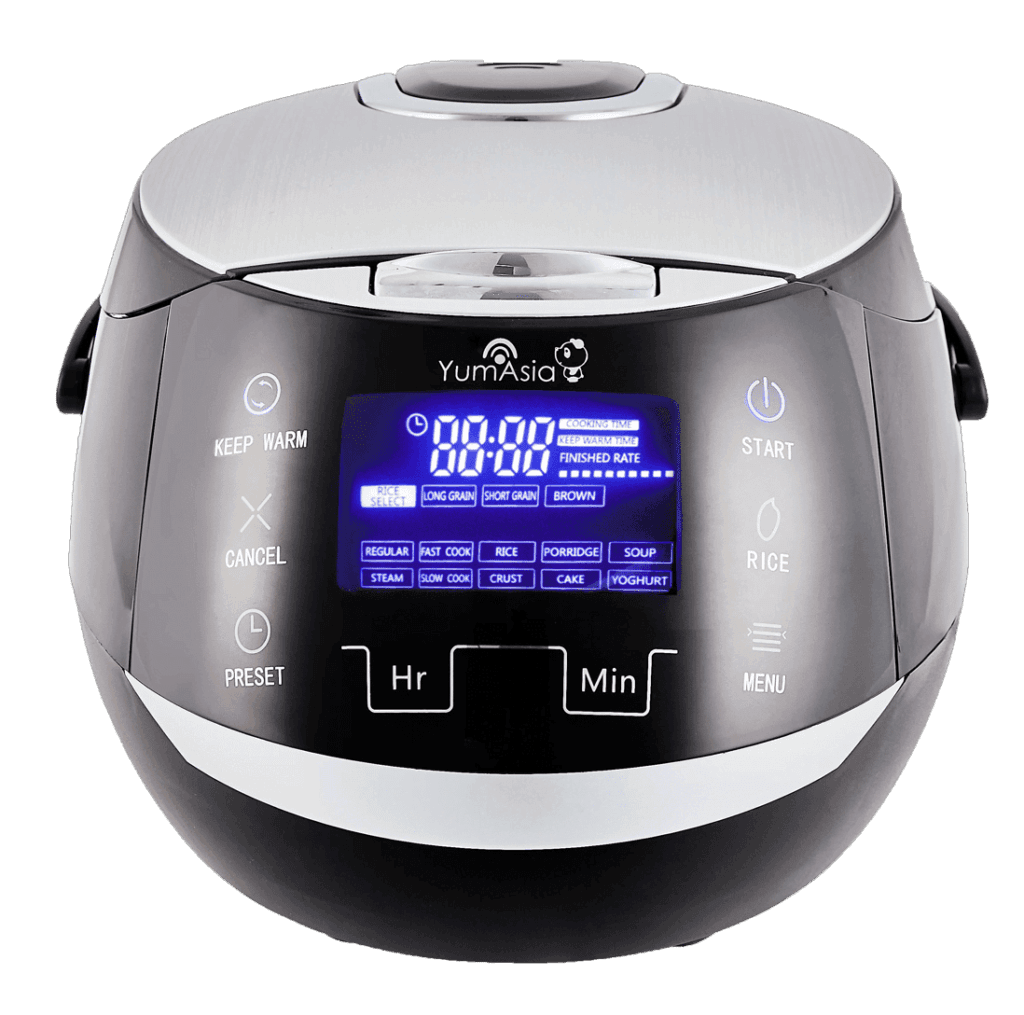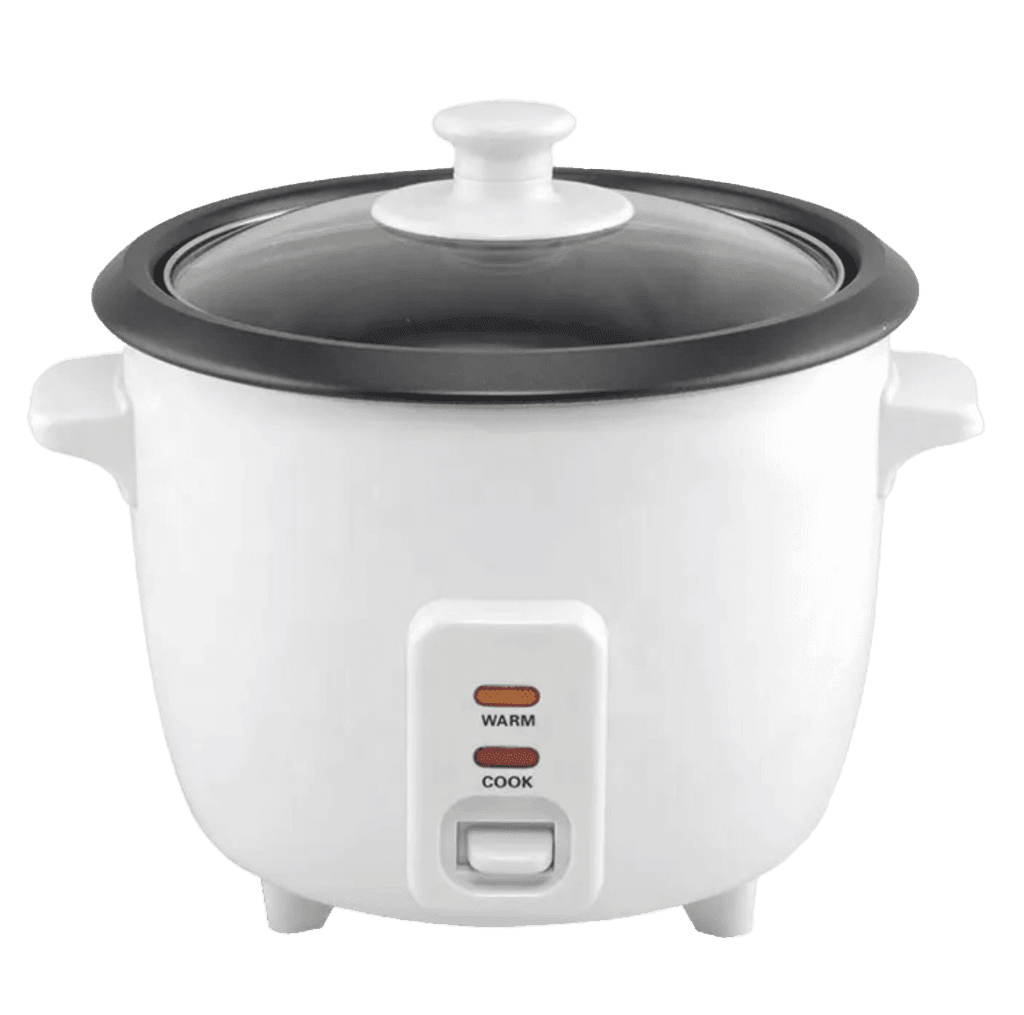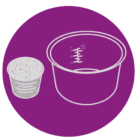Choose A Rice Cooker Key Things To Consider
At a glance...
- What Are Modern Rice Cookers?What Are Modern Rice Cookers?
- Our Rice Cookers Versus Other Rice CookersOur Rice Cookers Versus Other Rice Cookers
- What Size Of Rice Cooker?What Size Of Rice Cooker?
- The Important Rice FunctionsThe Important Rice Functions
- The Important Add-On FunctionsThe Important Add-On Functions
- What Type Of Inner BowlWhat Type Of Inner Bowl
- What Heating Method?What Heating Method?
- Displays And CountdownsDisplays And Countdowns
- Appearance And The RestAppearance And The Rest
-

We Help You Choose
What Are Modern Rice Cookers?
Going way back in time, the very old way of cooking rice would be a fire with some kind of clay pot that would boil the rice. Until recently a similar method has been used except the fire has been replaced by a basic heating element and the clay pot has been replaced with a basic non stick inner bowl. These are what we call very basic rice cookers They usually have a loose glass lid too and a very basic on/off switch.
Premium rice cookers are far more advanced using a heating method that is not just a basic boil. They use a clever brain (fuzzy logic) that calculates the correct amount of heat and type of heat applied to the rice. They have sensors in the unit, timer functions and a whole range of other features that not only make your rice taste amazing but make everything easier and more versatile too!
Our Rice Cookers versus Other Rice Cookers
Toggle below to see the differences
PREMIUM RICE COOKERS
OTHER RICE COOKERS
How Simple?
Take the stress out of cooking rice. No more hovering over the stove or having pans or budget rice cookers spit starchy water everywhere.
What Size Of Rice Cooker?
The first thing to consider is the size of the rice cooker you need. Rice cookers come in different sizes, these sizes are usually termed in cup sizes or litres. Yum Asia sells 5 different sized rice cookers – 2.5 cup (0.45 litre), 3.5 cup (0.6 litre), 5.5 cup (1 litre), 8 cup (1.5 litre) and 10 cup (1.8 litre). All of these maximum capacities are for uncooked white rice, brown rice capacity is lower due to the fact it cooks/expands differently to white rice.
Broadly speaking, the cup size of a rice cooker corresponds to how many people you are cooking for, however, it also depends on how much rice you usually cook per person. So, the rice measuring cup provided with rice cookers is 180ml/180g – remembering that 1ml=1g. These maximum capacities shown below should help you work out which rice cooker is the better option for you. The volumes show uncooked rice amounts so you also need to consider if you are going to be entertaining people or wanting to cook extra for lunches, if so, you should factor this into the size you want to buy.
The Important Rice Functions
Rice cookers differ in both the amount of rice functions that they offer and may also call certain functions different things. Here are a list of the most important rice functions that a modern rice cooker should have.
Can be short or long grain, fluffy and separate or sticky so you can eat it with chopsticks and depending on what type of white rice you are cooking would depend on what setting you would use on a rice cooker.
Roughly four times as long as it is wide and includes varieties such as white basmati and jasmine rice. If your rice cooker doesn’t have a long grain setting, then the ‘white’ setting should be used along with the water levels for ‘white’ on the inner bowl.
Short and plump and can include sushi rice, pearl rice and Thai sticky/glutinous rice. In rice cookers without a short grain setting, it should be cooked on the ‘white’ setting, however, some rice cookers like Kumo, Panda, Sakura, Bamboo, Fuji and the NS-YSQ10/18 have a dedicated short grain setting.
Can also be short or long grain but the over-riding factor is, that it’s brown rice, so it needs more cooking no matter the length of the grain so you should always use the ‘brown’ setting on a rice cooker. The cooking cycles for brown rice do take longer – this is because of two factors, first there is more bran on the outside of the rice grain, so it takes longer to cook and second because there is more water involved during the cooking cycle and it takes longer to evaporate.
Bamboo and Fuji have a setting called ‘Yumami’ for any type of white rice. It brings out the ‘umami’ taste, the rice is cooked in a different way (using a specially designed soaking and steaming cooking cycle) which makes the rice taste sweeter and moreish – it really does make a difference to the taste. We have further information on this setting on our Yum Factor page.The NS-YSQ10/18 also has a similar setting for white rice – ‘premium taste’ setting.
Bamboo and Fuji have an additional setting for brown rice – ‘GABA brown’ setting. This pre-soaks the rice at a specific temperature to sprout or ‘activate’ the rice. It’s said to release GABA (gamma-aminobutyric acid). We have further information about GABA brown rice and it’s benefits on our Yum Factor page. The YSQ10/18 also has this feature but the cooking time in Bamboo is shorted due to the Umai Induction Heating method of cooking the rice. Black and red rice should also be cooked on the ‘brown’ setting as, like brown rice, there is more bran on the grain and so they need additional cooking time which the brown rice setting allows.
Kumo is unique in that it has YumCarb settings for both white and brown rice. By cooking rice in the provided stainless steel steaming basket, the rice is cooked in a special way so that the sugars in the rice are not re-absorbed and results in the cooked rice being up to 25% lower in carb value.
The Important Add-On Functions
Whilst rice cookers are obviously very good at cooking rice they are also good at cooking certain other things. This is because the contained structure combined with their ability to steam and cook in a phased manner with precise temperature adjustments make them optimal to cook select add-on cooking capability.
Some rice cookers like Bamboo, Fuji, Sakura, Panda, Kumo, Hotaru the NS-TSQ10/18, the NL-AAQ10/18 have steaming setting and baskets included. This is very useful for creating full meals in the one appliance, you can steam veg, meat, fish, dumplings while you are cooking rice. You can even use the steam setting as a stand-alone steamer.
There are then some very unexpected settings on rice cookers – like cake baking (Panda, Bamboo, Sakura, Hotaru the NS-TSQ10/18) which produces fantastic cakes – cheesecake, banana cake, brownies, spiced apple cake – all are amazing and very moist because the cakes are steamed rather than baked. For some delicious recipes, see our dessert section!
All Yum Asia rice cookers can cook porridge – oatmeal or traditional rice porridge (known as congee). There’s nothing better than setting the rice cooker to have your porridge ready for breakfast on a cold winter’s day – here is our recipe for oat porridge.
Kumo, Panda, Bamboo Hotaru, Fuji and Sakura are unique in the rice cookers we sell in that they also have other useful features like a fully programmable slow cook setting (the NS-YSQ10/18 does have a slow cook, but it is very limited – you cannot set the time of the cooking cycle or use keep warm) and crust (or Persian Tahdig) setting. Sakura also has a soup setting for brilliant soups and yoghurt setting for making your own yoghurt from scratch.
Other grains – such as quinoa, millet, buckwheat, amaranth, cous cous and many more can be cooked in a rice cooker. All Yum Asia brand rice cookers come with a guide in the user manual for cooking other grains.
What Type Of Inner Bowl?
Increasingly important to a lot of people is the material the inner bowl is coated in. For example, Zojirushi rice cookers are coated in Sumiflon (a Teflon-like coating) Zojirushi do not make any other type of inner bowl, other than the Sumiflon coated ones. None of the inner bowls in our premium rice cookers flake, tarnish easily or disintegrate like more basic rice cookers bowls if you treat them carefully.
All of Yum Asia’s rice cookers have our signature ceramic coated inner bowls included as standard, we took on customers concerns regarding Sumiflon/Teflon and decided to only use hard-wearing, heavy duty ceramic coated inner bowls.
Our Ninja inner bowls supplied with Kumo, Panda, Sakura and Fuji models are minimum 2mm thick whilst the Hotaru IH and Bamboo IH model has a 3mm thick Joubu bowl and the Tsuki model has a 5.5mm thick handmade natural ceramic SHINSEI bowl. You really can feel the difference not only to look at but to feel the weight in your hands. All of the Zojirushi inner bowls are approximately 1.5mm in thickness.
- Consider Bowl Thickness
- What Coating Is It Made From?
- How Safe Is Your Inner Bowl?
- Do You Need Carry Handles?
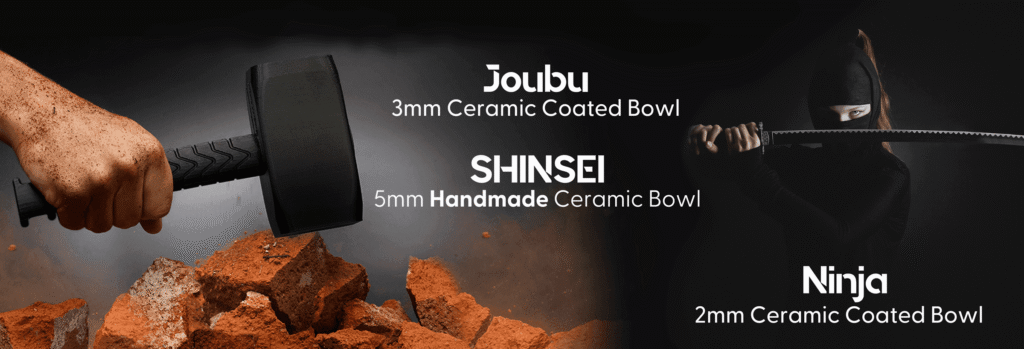
What Heating Method?
Conventional Heating
The majority of rice cookers that are available in the UK , Europe and the USA are basic conventional on/off with a loose fitting glass lid (during cooking starchy water can spit out) or are a basic jar type of rice cooker. These rice cookers are only marginally better than using a saucepan – they simply boil the rice, reacting to when a certain temperature is reached, it switches off. These types of rice cookers generally burn the rice or over-cook it. Our premium rice cookers are completely sealed units, so no mess is created when cooking and the fuzzy logic brains of the cookers are working. The fuzzy logic calculates carefully the temperatures and reacts, making the heating element react to different stages of the cooking cycle. The rice is cooked using many different types of heat cycles (phased cooking) rather than boiled and the resulting rice is far better in taste, aroma and texture.
Induction Heating (IH)
The other type of rice cooker is Induction Heating or IH. These rice cooker use coils in the bottom of the unit to create a magnetic field. When the stainless steel inductive layer of the non-stick ceramic inner cooking bowl is placed into the rice cooker and the unit is activated, a magnetic field is generated to create instant heat throughout this layer. Through this technology, the inner cooking pan itself rather than the heating element becomes the heat source utilising both even yet high heat and fine heat adjustments to control the cooking process.
Our Hotaru, Bamboo and Fuji models are the first Induction Heating rice cookers made for the UK and Europe. Exclusive to Yum Asia’s IH rice cooker models is UMAI Induction Heating (IH). Induction Heating in rice cookers occurs when coils in the bottom of the unit create a magnetic field that specifically heats up the inner bowl and contents. ‘Umai’ in Japanese means smart brain which refers to the microprocessor used to make fine adjustments in temperature and cooking times (phased cooking). Because our Umai IH sytem is so smart (and combines IH with advanced fuzzy logic), it makes our Bamboo and Fuji IH rice cookers more efficient, this means your rice is absolutely perfect every single time and it is cooked faster than other IH rice cookers.
Displays And Countdowns
Rice cookers differ in both the amount of rice functions that they offer and may also call certain functions different things. Here are a list of the most important rice functions that a modern rice cooker should have.
The first type of displays used in 1980s rice cookers until present day (the type of display found in calculators and Casio watches). Consume little power, are not versatile but are unstable and cannot be viewed in dark rooms
Low Emitting Diode or LED displays became popular in kitchen appliances in the late 1990s after the technology was perfected. More functionality and easier use in your kitchen no matter how dark or bright and importantly with very good energy efficiency.
Some rice cookers with LCD or LED displays may not have any type of countdown. At the very most they may just have a progress bar which shows the cooking duration. Given that most rice cookers now have a keep warm function, if you are not concerned with having your rice ‘just finished’ then a rice cooker with a cooker with no time countdown indicator may be okay for you. We do not sell any type of rice cooker with no countdown.
The majority of modern day rice cookers have some kind of countdown which appears when the last 10 minutes of cooking is happening. These types of countdowns are used in models by most major manufacturers as they are very accurate. The reason why the remaining duration of time to cooking completed is not displayed until the final 10 minutes is because the Micom processor in the rice cookers need to time to first calculate various cooking factors. These include, ambient room temperature, starting bowl water temperature, the type of rice being cooked, the function chosen and other factors. Most rice cookers can then only accurately determine the final 10 minutes and start counting down as they take time to work out the time taking to complete cooking.
Some rice cookers attempt to show a full countdown during the rice cooking process. Normally this type of attempt to determine the cooking time remaining is inaccurate where the countdown jumps around until the final stages of cooking as the Micom processor works out how much more cooking time is required based on the conditions of the cooking. So actually only the last 10 minutes or so is usually accurate as an indicator of remaining cooking time. Some more advanced models employ a combination of ‘smarter brain’ processing such as Yum Asia’s UMAI IH technology which can more accurately determine the remaining cooking time and in the case of their newer Fuji model uses a LOOP countdown also to give a full countdown effect.
Appearance and The Rest
Even the small details are important such as how the rice cooker looks, how healthy it is and if it can be kept looking fresh for a long life span
All of our rice cookers come in different colours, finishes and vary in their shape and syle. Think about if you want a metallic or glossy effect finish or a mixture of both. Do you want to go for minimalist or do you want to make a statement in your kitchen! Consider the shape and how cute do you want your rice cooker to look. The curvier models we sell (Sakura and Panda) are more typically Japanese and cute (Kawaii). Our Bamboo and Fuji models look ultra high end from the minute you set your eyes on them. The Zojirushi models are all of a rectangular shape with slight curves to their edges.
Certain models have features that make them easier to maintain and clean. Such as condensation collectors at the back of some models. All the models we sell have removable inner lids and steam caps (where excess water vents out out) for easy cleaning. Our Yum Asia models have easy clean control panels some of which are touch sensitive for better hygiene. Also some models have carry handles that help move them around the kitchen or wherever should you wish to easily hide them out of sight or put them in sight!
Be reassured that we can provide spare parts for all the products we sell. The most common parts of a rice cooker that eventually may need replacing are the inner bowls and inner lids. Some people even prefer to have a spare inner bowl for convenience or to help future proof their cooker. If you need an extra inner bowl to extend the life of your cooker (even though the bowls last a long time if cared for correctly) we can provide it. Please see our spare parts section for details. Please note that for Yum Asia brand products we can usually provide spare parts immediately but for Zojirushi spare parts they have to be ordered in advance and there is usually a delay before we can get the parts in stock.
These Links May Also May Be Useful
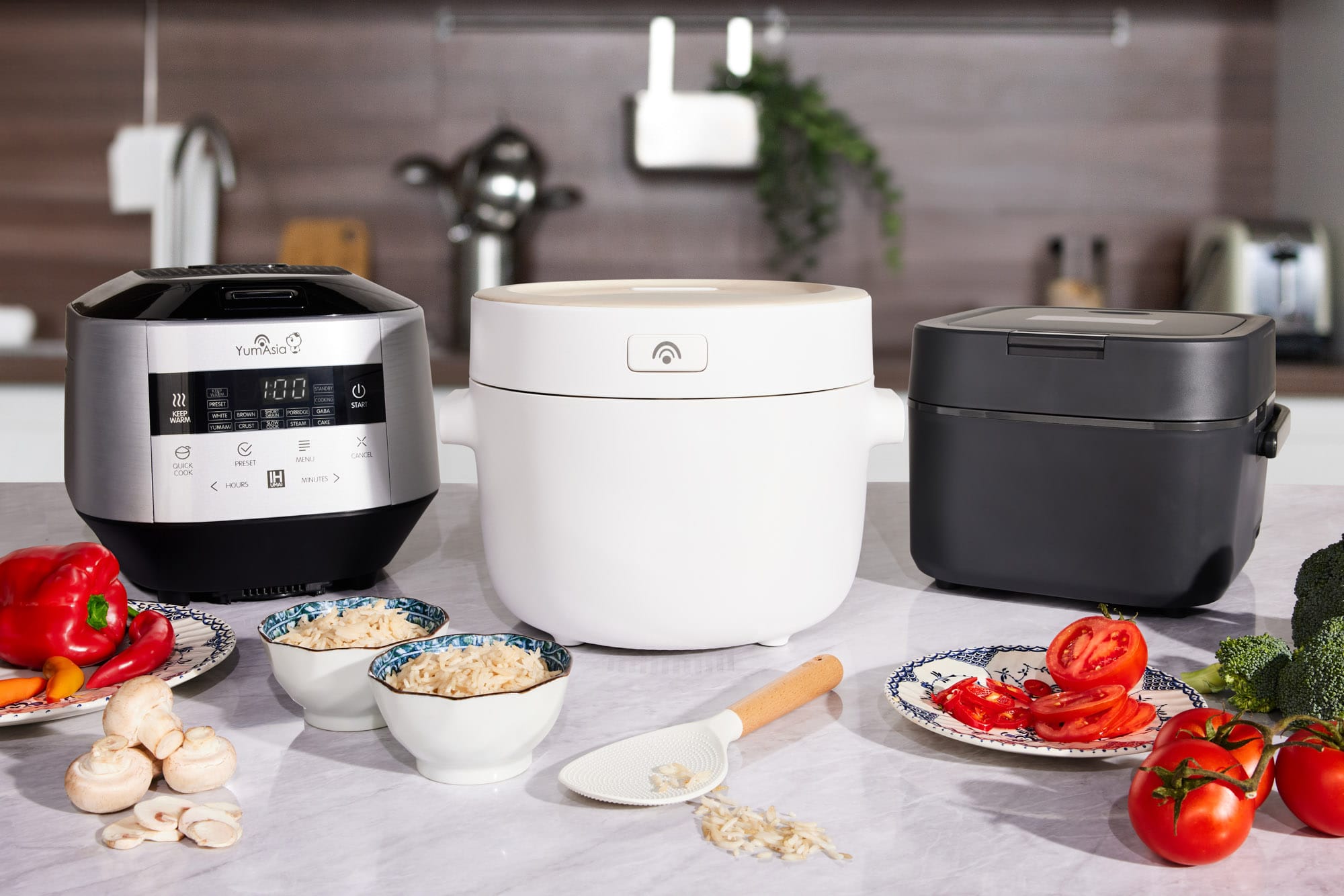
Learn why having a rice cooker should be an essential for any rice lover.
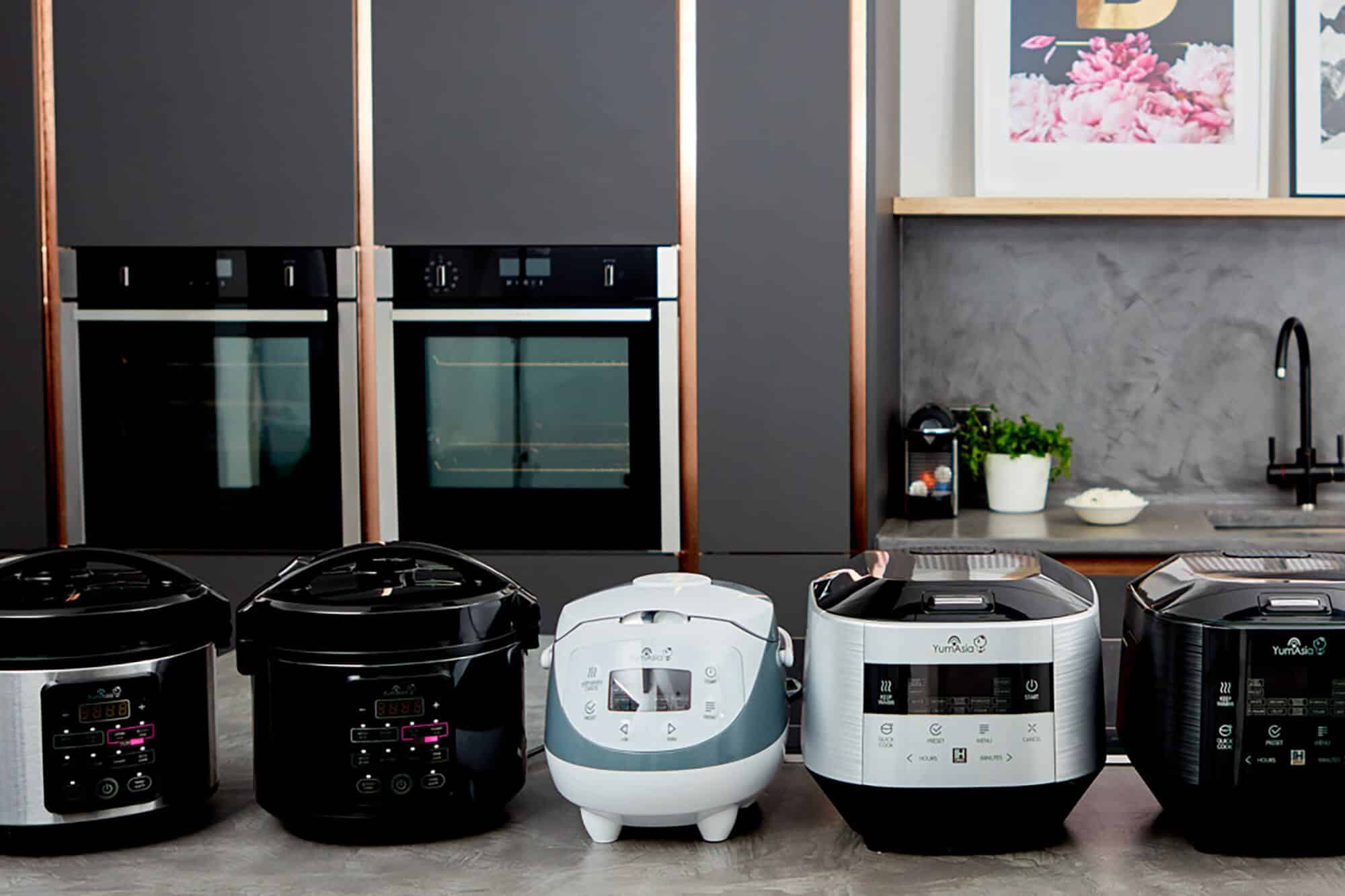
We have a very useful rice cooker comparison table where you can look at the features / functions of our rice cookers at a glance.
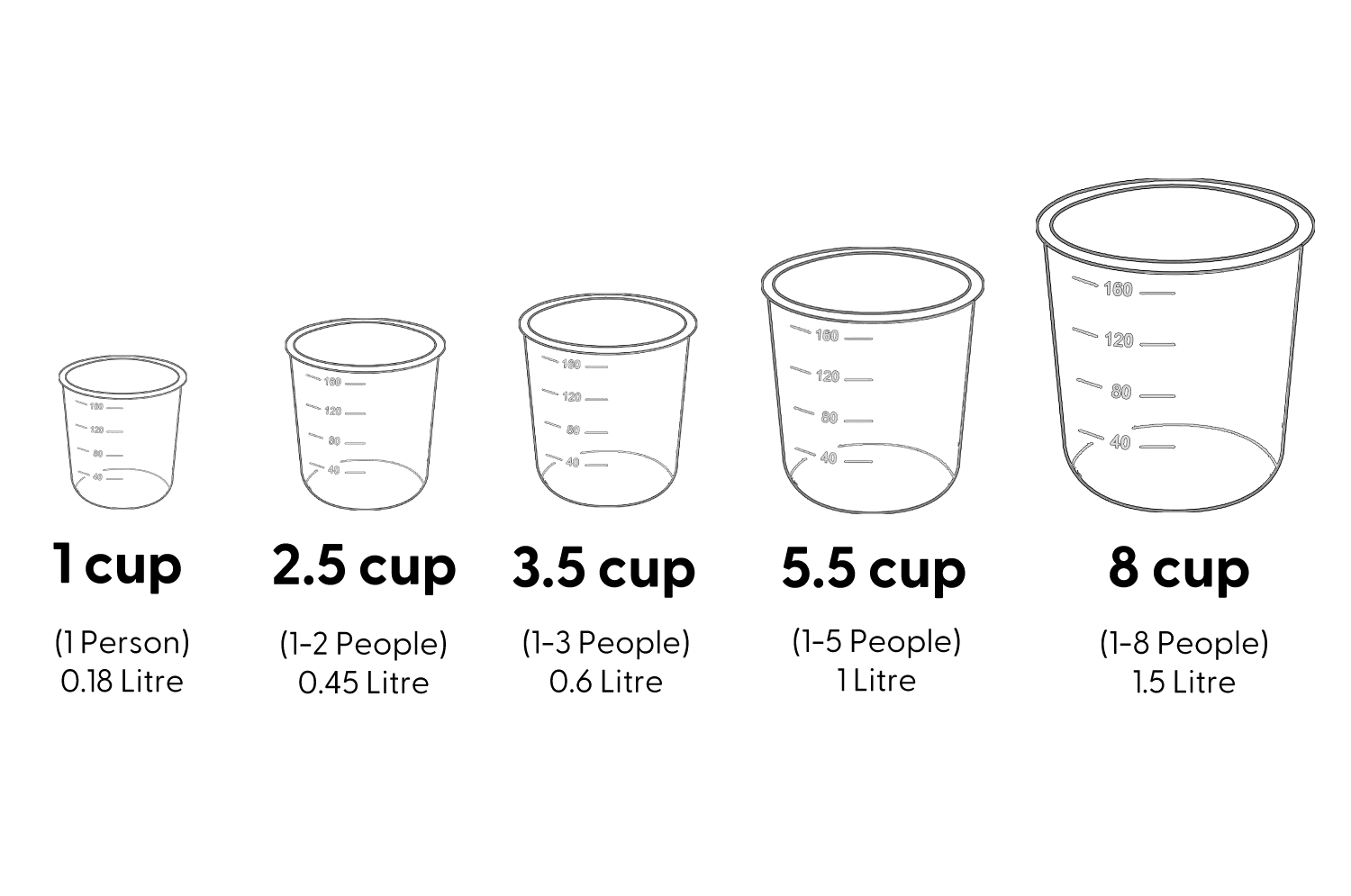
Let's talk about size and how to calculate your requirements which not only includes the amount of rice cooked but also the physical size of your cooker.
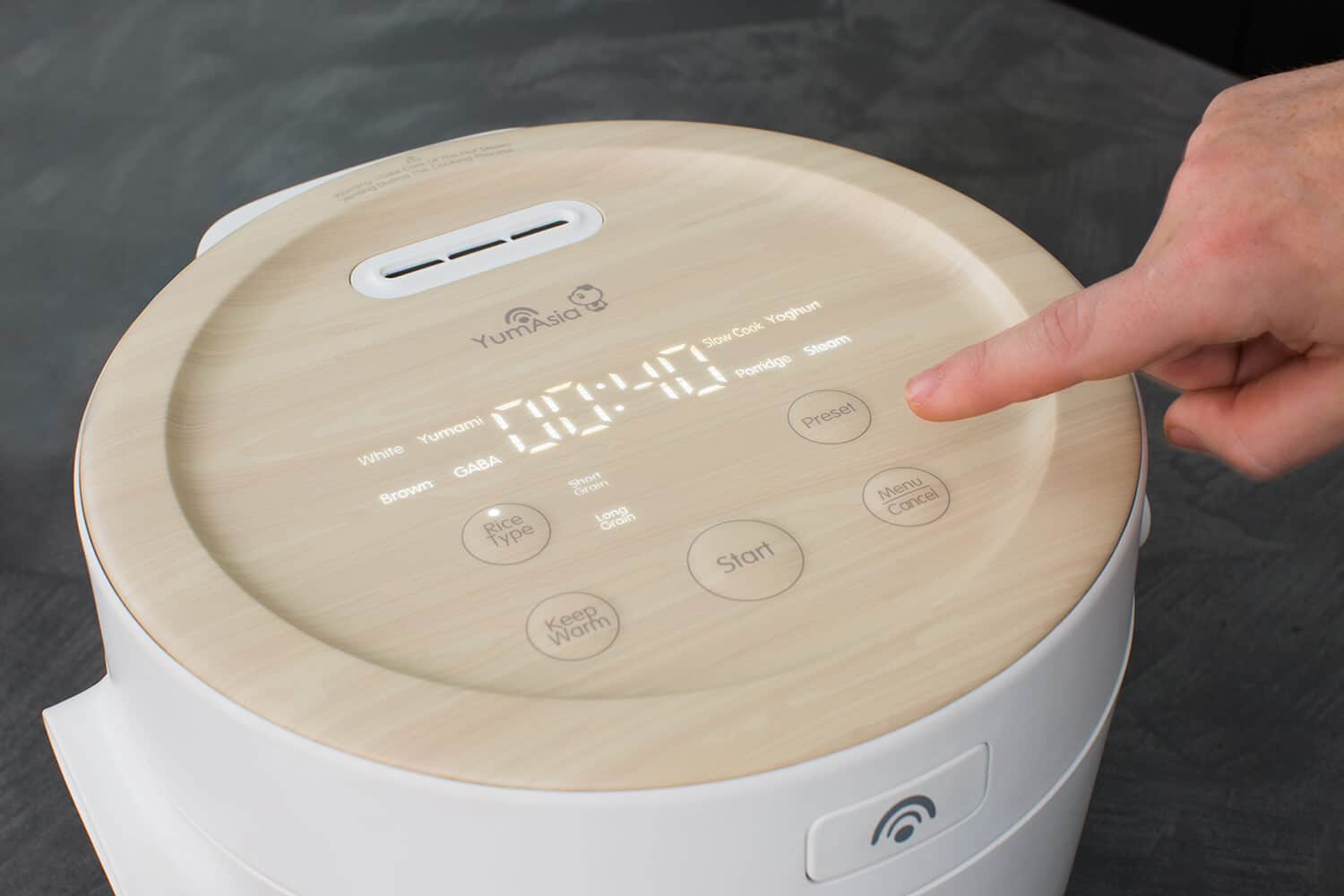
Arguably the most important part of a rice cooker. Learn which are more accurate and why and learn which have certain advantages over others.
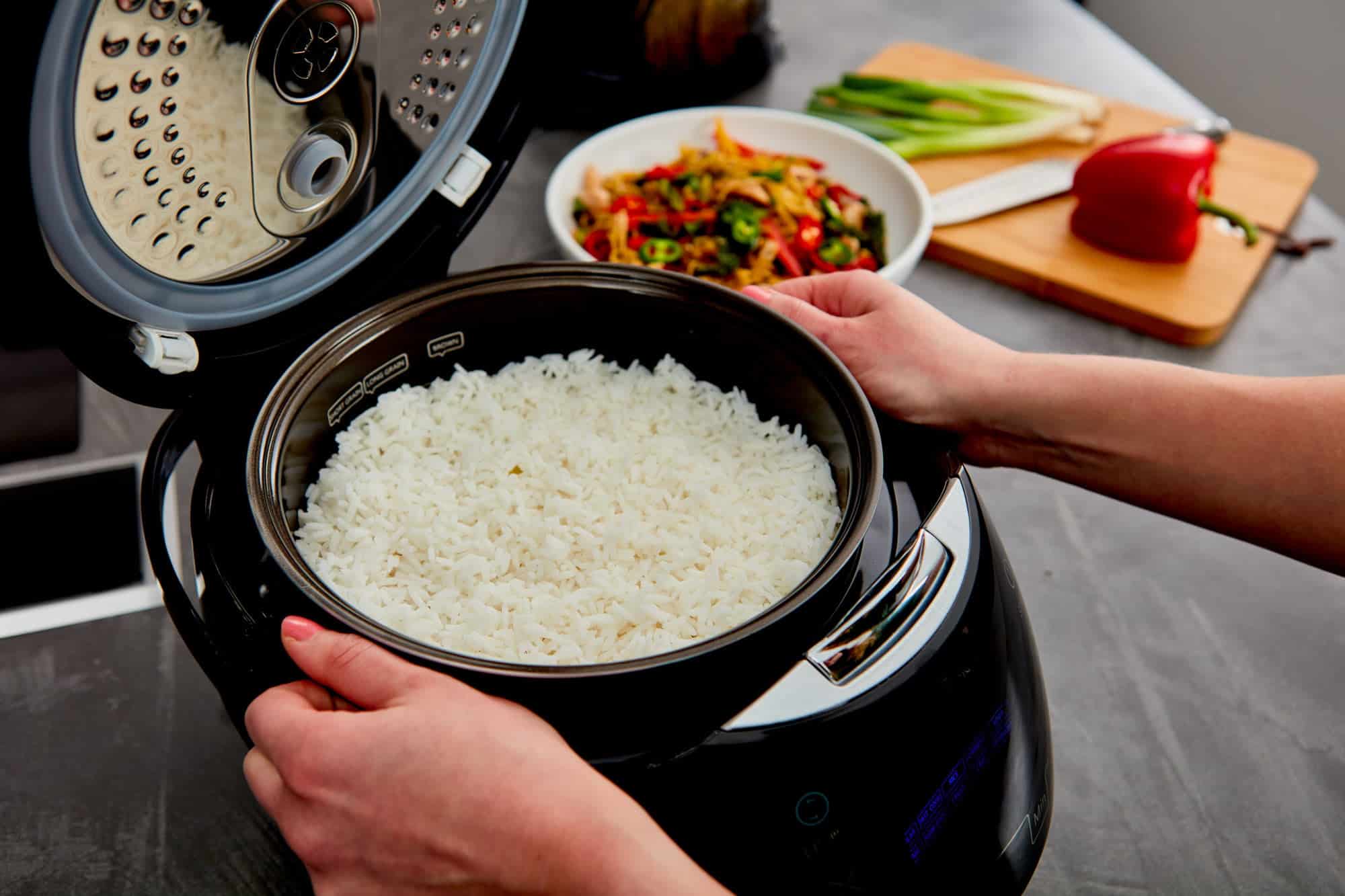
Arguably the most important part of a rice cooker but not all are created the same and some are better for you than others
We have a unique techologies that make our appliances stand out from the crowd. Thes are broad ranging so learn about them here..
FREQUENTLY ASKED QUESTIONS
Yes. The rice cookers and water heaters are factory made for UK / European 220-240V, 50Hz power or US power 120V, 60Hz. We sell US models on our USA website and UK/EU models on our EU/UK websites. Our cookers come with a 3 pin UK plug power cord for all UK orders and a 2 pin EU plug power cord for all EU orders. Please note that models bought in the US market run on a different power supply (110V) and WILL NOT work on UK or European power. Also models purchased in the EU and UK will not work on USA power supply. Please message us if you are unclear on which model is correct for your location.
The capacity of rice cookers can be confusing, especially because the international standard is to display the capacity in terms of litres of uncooked rice. To make it easy we have put together this table:
Capacity in cups* | Capacity in litres/kg | Number of people | Translation to cooked rice** |
|---|---|---|---|
3 cup | 0.5 litres or 500g | 1-3 people | 1.5 litres or 1.5kg |
5½ cup | 1 litre or 1kg | 1-5 people | 3 litres or 3kg |
8 cup | 1.5 litre or 1.5kg | 1-8 people | 4.5 litres or 4.5kg |
10 cup | 1.8 litre or 1.8kg | 1-10 people | 5.4 litres or 5.4kg |
* 1 cup = 180ml of uncooked rice
**1kg of uncooked rice = 3kg of cooked rice
Yes, if you want to cook just 1 cup of rice in Sakura or Bamboo, that’s not a problem. Even though there isn’t a mark for 1 cup on the inner bowl but it’s easy to measure the correct amount of water. When cooking one cup of rice, use the measuring cup, fill it to the top with water once so you get the correct amount of water and add this on top of the rice in the inner bowl.
The same goes for cooking half a cup in Panda, you would use the measuring cup filled with water to the half mark on the cup and add this on top of the rice in the inner bowl.
For Yum Asia models in Europe the manual is supplied in English, French, German, Italian and Spanish.
For Yum Asia models in the USA the manual is supplied in English, French and Spanish.
For Zojirushi models the language of the user manuals are English only
We supply many spare parts for our Yum Asia brand rice cookers such as inner bowls, inner lids. We also supply spare parts for Zojirushi from customers who have purchased their rice cookers from Yum Asia. Click here for our spare parts catalogue
Zojirushi IH models are very expensive and haven’t passed any CE safety tests, so therefore cannot be legally supplied within the UK or Europe.
Get answers to your questions
Try our help pages or get in touch
We work almost 24 hours, 7 days a week!
Our response usually takes up to 6 hours

